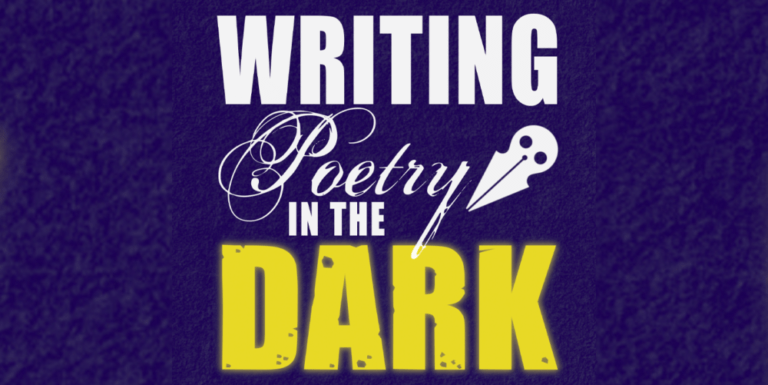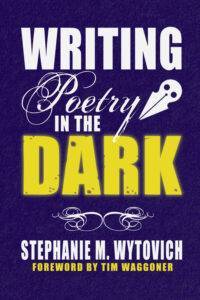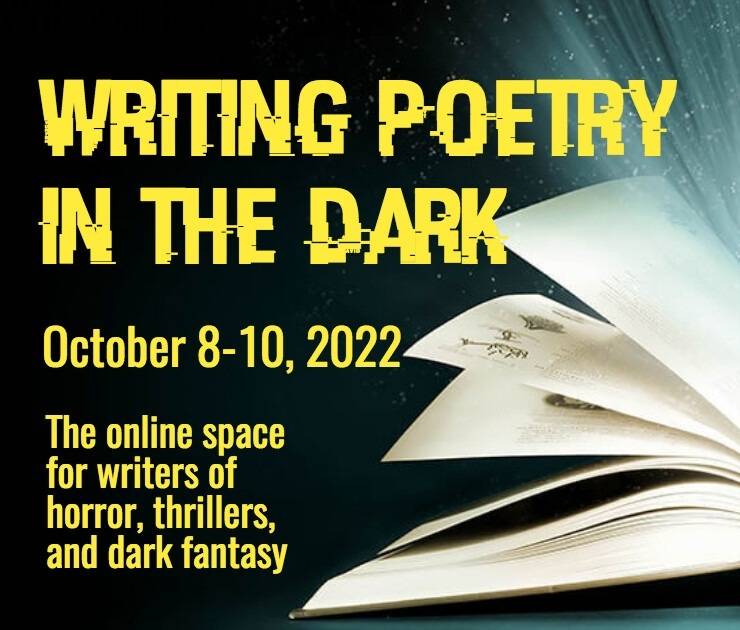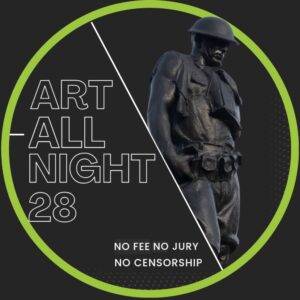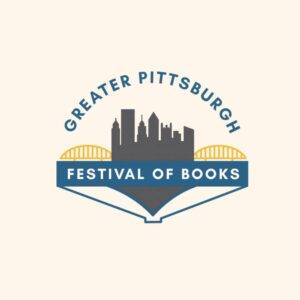From the Publisher: “Writing Poetry in the Dark, edited by Bram Stoker Award Winning Poet and Editor [and Pittsburgher! – ed.] Stephanie Wytovich, is a craft book being published October 18th from Raw Dog Screaming Press for speculative poets, by some of the most successful speculative genre poets. It includes a foreword by one of the genre’s most celebrated authors and creator of the Writing in the Dark brand, Tim Waggoner. This non-fiction essay book meditates on craft, genre, style, and form as acclaimed SF/F/H poets come together to talk about their process, outlook, and approach to writing and incorporating the speculative into their poems.
Included in Writing Poetry in the Dark are recommendations on how to bring fear to the page, write from the wound, let violence loose, channel the weird, and tackle the dark side of daily life. There are also practical suggestions for exploring different poetic forms and topics from haiku to historical, bringing something for every speculative poet or anyone who is interested in writing poetry with a genre twist. Some of the stellar cast of award-winning poets included are Linda Addison, Marge Simon, Christina Sng, Alessandro Manzetti, Sara Tantlinger, and many others.
Pre-order is available at: Writing Poetry in the Dark – Raw Dog Screaming Press : Raw Dog Screaming Press
More info About the Editor: Stephanie M. Wytovich is an American poet, novelist, and essayist. Her work has been showcased in numerous venues such as Weird Tales, Gutted: Beautiful Horror Stories, Fantastic Tales of Terror, Year’s Best Hardcore Horror: Volume 2, The Best Horror of the Year: Volume 8, as well as many others.
Wytovich is the Poetry Editor for Raw Dog Screaming Press, an adjunct at Western Connecticut State University, Southern New Hampshire University, and Point Park University, and a mentor with Crystal Lake Publishing. She is a member of the Science Fiction Poetry Association, an active member of the Horror Writers Association, and a graduate of Seton Hill University’s MFA program for Writing Popular Fiction. Her Bram Stoker Award-winning poetry collection, Brothel, earned a home with Raw Dog Screaming Press alongside Hysteria: A Collection of Madness, Mourning Jewelry, An Exorcism of Angels, Sheet Music to My Acoustic Nightmare, and The Apocalyptic Mannequin. Her debut novel, The Eighth, is published with Dark Regions Press.
Follow Stephanie M. Wytovich on her blog and on twitter.
Event Don’t miss out: There’s going to be a virtual Writing Poetry in the Dark conference on October 8-10th!
Editor’s Note:
If you’re reading this, welcome!
Writing Poetry in the Dark is a collection of essays that will start discussions and continue discourse about a variety of topics in the poetry community and in those surrounding the craft of writing in the areas of horror, science fiction, and fantasy. I worked hard to make this book accessible and beneficial for all writers and educators at any point in their career, so whether you’re just starting out or already a professional in the field, I think there will be something in this book for everyone, and that means fiction and nonfiction writers, too.
It is my belief that poetry is and can be for everyone, and it’s my hope that this book serves not only as a guiding light but as an inspirational tool for anyone flirting with the idea of writing a poem or two…or ten. I know as a kid, poetry seemed like this beautiful untouchable artform, and while I was positively enchanted with it, I didn’t think it was something that was for me, regardless of how much I read and analyzed countless poets. Sure, I’ve always considered myself studious, but poetry felt almost elitist at times, like there was a secret handshake I never learned, and as a girl who grew up in a small rural town with a graduating class of less than ninety students, I didn’t think poetry existed by or for people like me who maybe didn’t have as much world experience or access to resources as others maybe did.
It wasn’t until I let my guard down and started experimenting with form and space that I discovered there are many ways to write poetry and that half the battle to doing so was trusting my voice. I learned that while poetry could be ambiguous, academic, or highbrow, it could also be straightforward, queer, feminist, violent, or lush. Sure, it could be serious and steeped in realism, but it could also be satirical, haunting, or cosmic. Better yet, it could be all of those things at once. It was in that moment of infinite possibility that I stopped trying to fit poetry in a box of what I thought it was, and instead opened my eyes to what poetry could be.
As I write this, I’ve been working with Raw Dog Screaming Press for the past 10 years as their Poetry Editor, and I’ve personally been writing poetry and working in the genre for about 15 years now. Poetry—particularly speculative poetry—holds a special place in my heart, and like most genre writing, I think it exists as a vehicle to not only teach us about the world but to teach us about ourselves all while giving us the space and freedom to work out our fears and dreams in otherworldly, whimsical, and sometimes even (safely) macabre ways. That space for conversation both embraces and breeches the interpersonal distance we might have and need to take on certain topics of conversation to give voice to feelings and emotions that might not be easily conveyed with prose. And yet as I’ve continued to participate in the community through various editorial relationships, mentorships, and through my own creative work, I’ve noticed that while there are a ton of craft books out there about poetry, there isn’t one specifically aimed toward speculative poetry.
That’s where this book comes in.
In an effort to speak to topics such a world-building, magic, dream studies, violence, and mythology, I’ve worked with a selection of my favorite contemporary poets to build a book that acts as both a resource on craft and an insight into personal process and methodology when it comes to writing the strange and unusual. You’ll learn about the intersection of comedy and horror, hear tales from the trenches of collaborative projects, and get about a half dozen or so more books to add to your TBR as you write haiku, practice writing through various POVs, and learn how to create and work with monsters both past and present.
With that said, I hope you’ll enjoy this book as much as I enjoyed working on it, and it’s my wish that you’ll listen to the creative voices inside of you and maybe branch out and try something new or perhaps finish that project that you’ve had on the backburner for far too long.
Like I said, poetry is for everyone and it’s healing and political and versatile and filled with just endless possibilities, so experiment, open your mind, try new things.
You never know what you’ll summon in the process.
–Stephanie M. Wytovich, Editor
This excerpt from Writing Poetry in the Dark has been published here courtesy of the editor and publisher and should not be reprinted without permission.


